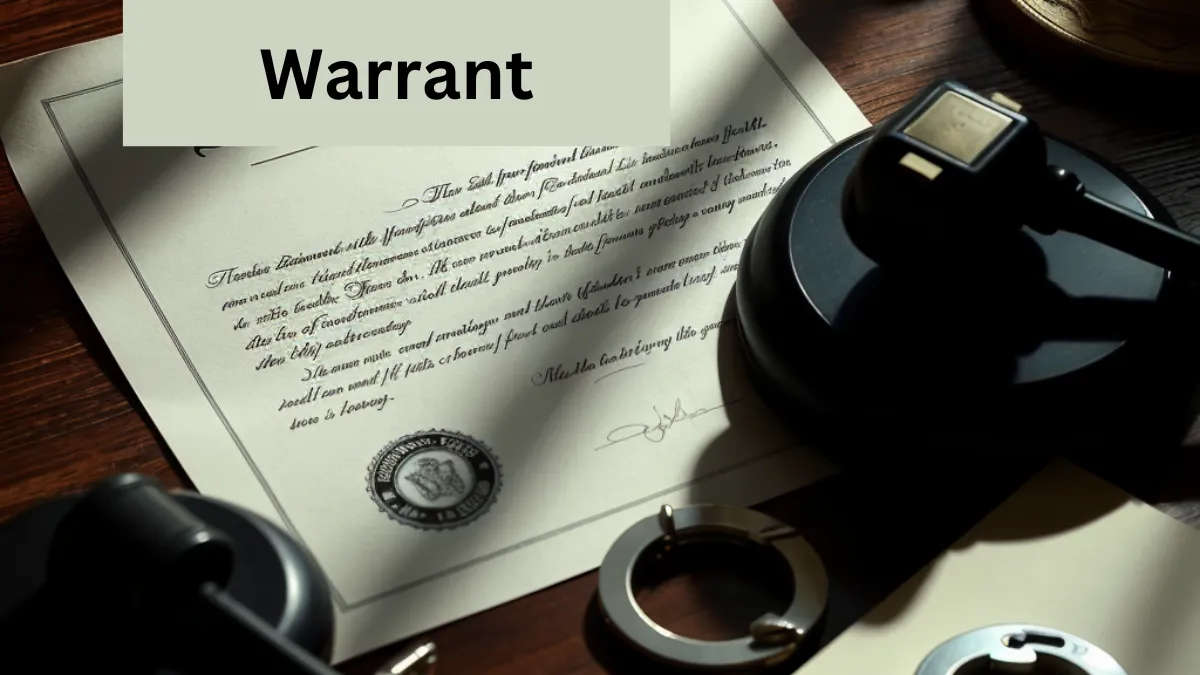Table of Contents
If you have a warrant, can you just pay for it? This is a question many people with outstanding warrants wonder about. While it may seem like a simple solution, the truth is more complicated. This article will explore the latest updates and facts about paying off a warrant. We’ll break down the legal consequences, options available, and essential steps you need to take. Understanding how warrants work can save you from making costly mistakes, so let’s dive in!
If You Have a Warrant, Can You Just Pay It: What Is a Warrant?
Before answering, if you have a warrant, can you just pay for it? We first need to understand what a warrant is. A warrant is an official document that a magistrate or court issues, allowing law enforcement to take a specific action. Two prevalent kinds of warrants are as follows:
- Arrest Warrant: Issued when someone is suspected of committing a crime.
- Bench Warrant: Issued when someone fails to appear in court or violates a court order.
Both types can lead to serious legal consequences if not appropriately addressed.
If You Have a Warrant, Can You Just Pay It: Can You Pay Off an Arrest Warrant?
Now, if you have a warrant, can you pay it off? The answer is not exactly. Arrest warrants usually can’t be resolved by simply paying a fine. These warrants are tied to criminal charges, meaning you must face the legal process. Ignoring or trying to pay off an arrest warrant without appearing in court will not make the problem go away. Instead, the next step should be contacting an attorney or the court to arrange a resolution.
Why Paying Off Arrest Warrants Doesn’t Work
There’s a common misconception that if you have a warrant, you can pay it off like a speeding ticket. Arrest warrants don’t work this way. These warrants are issued because the court wants you to appear in person. Even if fines are involved in your case, they are often a part of the resolution after you’ve been through the legal process. Simply paying money doesn’t resolve criminal charges.
If You Have a Warrant Can You Just Pay It: Can You Pay Off a Bench Warrant?
Unlike arrest warrants, bench warrants are often tied to civil matters, like missing a court date or not paying a fine. So, if you have a warrant, can you just pay it when it’s a bench warrant? In some cases, yes. Many courts will allow you to pay the fine related to the missed appearance or violation, which will clear the warrant. However, you may still need to appear in court, depending on the nature of the offence.
How to Resolve a Bench Warrant
If you have a bench warrant, the best option is to contact the court. Many courts have systems to help you resolve the issue without arrest. Here’s what you can do:
- Contact the court: Find out what is required to clear the warrant.
- Pay any outstanding fines: If the warrant is due to non-payment, settling the fine could resolve the issue.
- Appear in court: Schedule a court appearance to address the warrant if the court requires it.
If You Have a Warrant Can You Just Pay It: What Happens If You Ignore a Warrant?

If you have a warrant, ignoring it can lead to severe consequences. Here’s what can happen if you don’t address the situation:
- Arrest: Law enforcement can arrest you anytime, whether at work, home, or a routine traffic stop.
- Additional charges: Ignoring a warrant can lead to extra charges, especially if you try to avoid law enforcement.
- Increased fines: Fines and penalties can grow the more extended the warrant is unresolved.
- Impact on your record: Warrants, especially unresolved ones, can harm your criminal record and affect future opportunities.
If You Have a Warrant Can You Just Pay It: Steps to Take If You Have a Warrant
Can you pay the warrant if you have one? As we’ve seen, the answer varies based on the type of warrant. To avoid arrest and additional penalties, it’s essential to follow these steps:
- Find out what kind of warrant you have: Contact the court to determine whether it’s an arrest or bench warrant.
- Consult a lawyer: Legal counsel can help you understand your alternatives and guide you through the legal process.
- Pay any fines if applicable: For certain bench warrants, paying fines can help resolve the issue quickly.
- Schedule a court appearance: If required, attend court to resolve the matter and avoid further penalties.
Also Read: Modernist Writing Style Harlem Renaissance: Unveiling Hidden Brilliance
If You Have a Warrant Can You Just Pay It: Can You Avoid Jail Time by Paying a Warrant?

Many people wonder if paying a fine will help them avoid jail time. If you have a warrant, can you just pay it and avoid arrest? The reality is that it depends on the case. Paying fines might be enough for minor civil offences to clear the warrant and avoid jail. However, paying a fine for more serious criminal cases won’t eliminate the need to appear in court, and jail time could still be a possibility.
When Paying a Fine Isn’t Enough
If the warrant is tied to criminal charges, paying a fine won’t remove the warrant. You will still need to go through the legal process. This could include appearing in court, negotiating a plea, or even serving jail time if convicted. Simply paying a fee won’t resolve these situations.
So, if you have a warrant can you just pay it? The truth is, it depends on the type of warrant. While you may be able to pay off certain bench warrants to avoid further legal action, arrest warrants usually require court appearances and legal processes. It’s crucial to quickly address any warrant you may have to prevent additional consequences like fines, arrest, or a criminal record.





